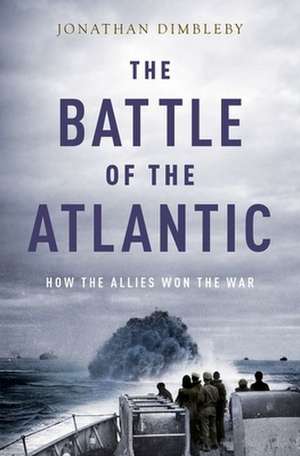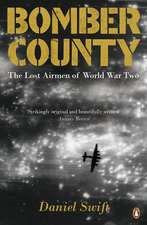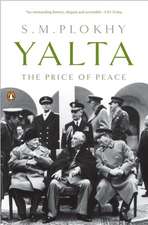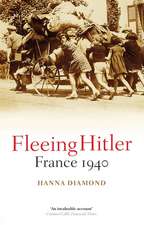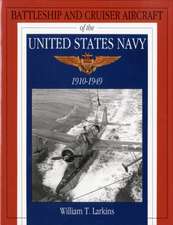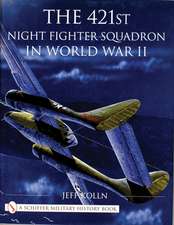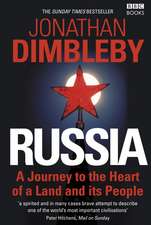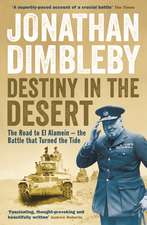The Battle of the Atlantic
Autor Jonathan Dimblebyen Limba Engleză Hardback
England's very survival depended on assistance from the United States, much of which was transported across the ocean by boat. The shipping lanes thus became the main target of German naval operations between 1940 and 1945. The Battle of the Atlantic and the men who fought it were therefore crucial to both sides. Had Germany succeeded in cutting off the supply of American ships, England might not have held out. Yet had Churchill siphoned reinforcements to the naval effort earlier, thousands of lives might have been preserved. The battle consisted of not one but hundreds of battles, ranging from hours to days in duration, and forcing both sides into constant innovation and nightmarish second-guessing, trying desperately to gain the advantage of every encounter. Any changes to the events of this series of battles, and the outcome of the war-as well as the future of Europe and the world-would have been dramatically different.
Jonathan Dimbleby's The Battle of the Atlantic offers a detailed and immersive account of this campaign, placing it within the context of the war as a whole. Dimbleby delves into the politics on both sides of the Atlantic, revealing the role of Bletchley Park and the complex and dynamic relationship between America and England. He uses contemporary diaries and letters from leaders and sailors to chilling effect, evoking the lives and experiences of those who fought the longest battle of World War Two. This is the definitive account of the Battle of the Atlantic.
| Toate formatele și edițiile | Preț | Express |
|---|---|---|
| Paperback (2) | 71.89 lei 23-34 zile | +29.43 lei 7-13 zile |
| Penguin Books – 18 mai 2016 | 71.89 lei 23-34 zile | +29.43 lei 7-13 zile |
| – | 152.16 lei 3-5 săpt. | |
| Hardback (1) | 246.32 lei 3-5 săpt. | |
| Oxford University Press – | 246.32 lei 3-5 săpt. |
Preț: 246.32 lei
Nou
Puncte Express: 369
Preț estimativ în valută:
47.13€ • 51.36$ • 39.72£
47.13€ • 51.36$ • 39.72£
Carte disponibilă
Livrare economică 02-16 aprilie
Preluare comenzi: 021 569.72.76
Specificații
ISBN-13: 9780190495855
ISBN-10: 0190495855
Pagini: 560
Dimensiuni: 163 x 239 x 48 mm
Greutate: 0.91 kg
Editura: Oxford University Press
ISBN-10: 0190495855
Pagini: 560
Dimensiuni: 163 x 239 x 48 mm
Greutate: 0.91 kg
Editura: Oxford University Press
Notă biografică
Jonathan Dimbleby is a writer, broadcaster and filmmaker. His books include Russia: A Journey to the Heart of a Land and its People, and the highly acclaimed Destiny in the Desert: The Road to El Alamein.
Recenzii
This
isan
exceptionally
vivid
accountof
one
of
the
critical
campaigns
of
the
Second
World
War
bya
masterly
writer
Winston Churchill famously described the Battle of the Atlantic as 'a war of groping and drowning, a war of ambuscade and stratagem, a war of science and seamanship' andno book depicts all of those myriad aspects better than Jonathan Dimbleby's majestic overview.His judgments can sometimes be harsh and arebound to be controversial, but they are backed up with wide reading, diligent scholarship and cogent argument.This is a truly gripping accountof a campaign that the author rightly puts epicentral to the Allied victory in the Second World War.
A fascinatingstory written with bite and grip of one of the most crucial showdowns of the twentieth century- of a victory wrung out of the unforgiving Atlantic swell by sailors and airmen using the best technology and Intelligence that those on land could provide. How close-run it was and the price of losing would have been catastrophe, defeat and darkness.Compelling
Jonathan Dimbleby's second volume on the Second World War iseven better than its predecessor.The Battle of the Atlanticis a gripping account of the Allies' hard-won victory at sea. Dimbleby has delivereda masterful narrative that challenges many of the received views about this often overlooked conflictthat foretold the defeat of Nazism.
Excellent on the characters of individual commanders . . . But perhaps the book's greatest strength is its analysis of the strategic side of the battle.Regularly switching from vivid coverage of individual encounters at sea, the narrative reveals the intense discussions that took place at the highest levels to decide naval policy, especially among Churchill, Roosevelt and their military advisers. It is [the]controversial assertion, backed by solid research and a readable style, that makes this book so compelling.
Starred review."A gripping history overflowing with anecdotes and enough calamity, misery, explosions, and individual valor for a Hollywood disaster epic."
A gripping read and a great contribution to the history of the Second World War.The author realizes his immense ambition of bringing out the human aspects of the drama at every level, from the heads of state to the crews in the Atlantic, while also bringing important nuances to received views on the struggle against the U-boats, and, indeed, on Churchill's war leadership.An epic account.
In this refreshing book Jonathan Dimblebyskilfully weaves together front line accounts and high policy discussionsto provide a gripping and accessible new account of themost important campaign of the Second World Waragainst Germany.
The epic Battle of the Atlantic can only really be understood when set against the strategic context of the time. Thishighly engaging historydoes this by combining gripping accounts of the tactics and operational fortunes of the Germans and the Allies in this bitterest of battles withan authoritative review of the strategic thinkingthat helps explain their motives and their responses at the highest national level, and that shows why victory was so important for both sides.
Dimbleby makes a convincing case that of all the campaigns of WWII, the struggle for dominance over the North Atlantic was the most important. . . The history of the battle for the Atlantic is well documented, but Dimbleby's work, with its emphasis on the strategic importance of the battle, is an excellent addition to the story, andexpert historians as well as general readers can enjoy this effort
Dimbleby'sincisive, gripping narrative uniquely places the campaign in the context of the entire waras it recounts thehorror and humanityof life on those perilous oceans.
The strength of the book is itsvivid evocation of dramatic events
The Battle of the Atlanticisa wonderfully readable mix of vivid personal storiesand the penetrating questions that you wish someone had put to Churchill
Dimbleby captures the savagery of the fighting and of the sea itself... he hastackled the complexities in a very accessible way; but more importantly he haswoven a compelling narrativeof the people who fought, directed and ultimately decided our fate
I liked Jonathan Dimbleby'sThe Battle of the Atlanticand was gobsmacked to learn that the Germans read British radio messages much better than we read theirs. Air Ministry obstinacy (in failing to release aircraft from futile area bombing for anti-submarine patrols) nearly cost Britain the war
Fascinating
I am chilled to the bone and beyond ...the most extraordinary story ... absolutely fascinating
Anaccessible and anecdotalaccount of the battle and the men who waged it,full of colour and surprising detail
Fascinating, thought-provoking and entertaining.Explodes a number of self-serving myths
Freshandprovocative
A wonderfully incisive, superbly written history.What Dimbleby has nailed so brilliantly is what so many war historians miss: the big picture
Winston Churchill famously described the Battle of the Atlantic as 'a war of groping and drowning, a war of ambuscade and stratagem, a war of science and seamanship' andno book depicts all of those myriad aspects better than Jonathan Dimbleby's majestic overview.His judgments can sometimes be harsh and arebound to be controversial, but they are backed up with wide reading, diligent scholarship and cogent argument.This is a truly gripping accountof a campaign that the author rightly puts epicentral to the Allied victory in the Second World War.
A fascinatingstory written with bite and grip of one of the most crucial showdowns of the twentieth century- of a victory wrung out of the unforgiving Atlantic swell by sailors and airmen using the best technology and Intelligence that those on land could provide. How close-run it was and the price of losing would have been catastrophe, defeat and darkness.Compelling
Jonathan Dimbleby's second volume on the Second World War iseven better than its predecessor.The Battle of the Atlanticis a gripping account of the Allies' hard-won victory at sea. Dimbleby has delivereda masterful narrative that challenges many of the received views about this often overlooked conflictthat foretold the defeat of Nazism.
Excellent on the characters of individual commanders . . . But perhaps the book's greatest strength is its analysis of the strategic side of the battle.Regularly switching from vivid coverage of individual encounters at sea, the narrative reveals the intense discussions that took place at the highest levels to decide naval policy, especially among Churchill, Roosevelt and their military advisers. It is [the]controversial assertion, backed by solid research and a readable style, that makes this book so compelling.
Starred review."A gripping history overflowing with anecdotes and enough calamity, misery, explosions, and individual valor for a Hollywood disaster epic."
A gripping read and a great contribution to the history of the Second World War.The author realizes his immense ambition of bringing out the human aspects of the drama at every level, from the heads of state to the crews in the Atlantic, while also bringing important nuances to received views on the struggle against the U-boats, and, indeed, on Churchill's war leadership.An epic account.
In this refreshing book Jonathan Dimblebyskilfully weaves together front line accounts and high policy discussionsto provide a gripping and accessible new account of themost important campaign of the Second World Waragainst Germany.
The epic Battle of the Atlantic can only really be understood when set against the strategic context of the time. Thishighly engaging historydoes this by combining gripping accounts of the tactics and operational fortunes of the Germans and the Allies in this bitterest of battles withan authoritative review of the strategic thinkingthat helps explain their motives and their responses at the highest national level, and that shows why victory was so important for both sides.
Dimbleby makes a convincing case that of all the campaigns of WWII, the struggle for dominance over the North Atlantic was the most important. . . The history of the battle for the Atlantic is well documented, but Dimbleby's work, with its emphasis on the strategic importance of the battle, is an excellent addition to the story, andexpert historians as well as general readers can enjoy this effort
Dimbleby'sincisive, gripping narrative uniquely places the campaign in the context of the entire waras it recounts thehorror and humanityof life on those perilous oceans.
The strength of the book is itsvivid evocation of dramatic events
The Battle of the Atlanticisa wonderfully readable mix of vivid personal storiesand the penetrating questions that you wish someone had put to Churchill
Dimbleby captures the savagery of the fighting and of the sea itself... he hastackled the complexities in a very accessible way; but more importantly he haswoven a compelling narrativeof the people who fought, directed and ultimately decided our fate
I liked Jonathan Dimbleby'sThe Battle of the Atlanticand was gobsmacked to learn that the Germans read British radio messages much better than we read theirs. Air Ministry obstinacy (in failing to release aircraft from futile area bombing for anti-submarine patrols) nearly cost Britain the war
Fascinating
I am chilled to the bone and beyond ...the most extraordinary story ... absolutely fascinating
Anaccessible and anecdotalaccount of the battle and the men who waged it,full of colour and surprising detail
Fascinating, thought-provoking and entertaining.Explodes a number of self-serving myths
Freshandprovocative
A wonderfully incisive, superbly written history.What Dimbleby has nailed so brilliantly is what so many war historians miss: the big picture
